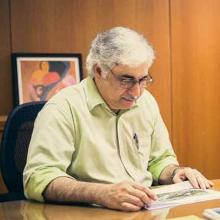This report is about the road we have travelled since the end of 2012. Now we have reached a meadow from where we can survey what has passed and look into the future as we move on and climb higher.
First, let me mention some foundational aspects of the ICTS that have been firmed up during the past two and a half years. The TIFR Council has formally constituted the ICTS faculty. Subhro Bhattacharjee (condensed matter physics), Rukmini Dey (mathematics), Rajesh Gopakumar (string theory), Vijay Kumar Krishnamurthy (physical biology) and Anupam Kundu (statistical physics) are our new faculty members. Bala Iyer also joined us as a Visiting Professor in 2015.
The in-house research at ICTS is organized as a union of families of researchers. The scientific questions that drive the current ICTS faculty research are from the broad areas of Astrophysical Relativity, Data Assimilation and Dynamical Systems, Statistical Physics, Condensed Matter Physics, Physical Biology and String Theory. There is a dedicated effort to establish a unit in interdisciplinary/exploratory mathematics.
ICTS has a vigorous Ph.D students’ program. The students are stationed in Bengaluru and their course requirements for a degree from TIFR are partly fulfilled by arrangements with various institutions in Bengaluru. A strong postdoctoral program has also been initiated. ICTS has also recently initiated the ICTS-S.N. Bhatt Memorial Excellence Fellowship Program to support eight-week long summer internship for exceptional undergraduate students from around the country.
Several members of our faculty have been recognized with awards, grants and fellowships within India as well as internationally. The details have been provided within the report.
ICTS was awarded in 2015 the prestigious ‘Targeted Grants to Institutes’ from the Simons Foundation, USA. The AIRBUS Corporate Foundation grant for an international teaching and research chair entitled ‘Mathematics of Complex Systems’, which ICTS shares with the Centre for Applicable Mathematics, underwent a successful annual review and continues. Both these grants lend enormous encouragement to a fledgling Centre and enhance the ability of ICTS to conduct programs, invite outstanding postdocs and long term visiting professors.
The new ICTS Campus has started functioning. The campus is equipped with a modern library that will provide access to books and electronic resources on advanced topics; state-of-the-art computing and networking infrastructure; a data centre with high-speed connectivity and extensive storage facility for doing big-data sciences; conference and lecture halls equipped with high-end audio-video equipment for recording and broadcasting ICTS programs; healthcare, childcare and recreational facilities for members and visitors.
Besides its regular scientific activities, ICTS also provides a platform for new science initiatives in India. A Tier-2 LIGO data center and gridcomputing site has already begun to take shape at ICTS. In addition, a proposal has been submitted to continue “IndiaLight”, India’s first fully dedicated largedata optical connectivity to the GLORIAD research network.
Given a strong faculty and excellent infrastructure, the third foundational component is administrative and technical support for faculty and visitors. ICTS has succeeded in putting together an excellent proactive team.
Eminent scientists Nima Arkani-Hamed, Sankar Das Sarma and Boris Shraiman have joined as new members of the International Advisory Board. ICTS strongly believes in the importance of forging partnerships between basic sciences, technology and industry in order to sustain a healthy and productive interaction between these endeavors. Hence besides distinguished scientists the ICTS Board needs guidance in its interface with civic society and to create a sustainable social and financial support system for itself. I am happy to say that Kris Gopalakrishnan, co-founder of the iconic Infosys Technologies of Bengaluru agreed to be a member of the IAB and partner and advise ICTS to take this forward.
ICTS has continued to organize programs and discussion meetings. This way we continue to provide the platform and resources for researchers to congregate over extended periods of time. ICTS encourages cross-disciplinary collaborations and interactions between theorists and experimentalists, and fosters research areas of importance to India.
In 2013, ICTS and ICTP, Trieste, got together to form the ICTP-ICTS Joint Program in Biology. Every year a Winter School on Quantitative Systems Biology is held alternately in Trieste and Bengaluru. This year in December, the fourth school in this series will be held in ICTS.
Another central activity of the ICTS is outreach, a crucial component of which is to organize public lectures by distinguished scientists. During this period, Cumrun Vafa (Harvard University), Boris Shraiman (KITP, Santa Barbara), Stuart Parkin (Director Max Planck Institute for Microstructure Physics) and Sankar Das Sarma (University of Maryland) visited ICTS and delivered public lectures.
In 2013 ICTS joined hands with other mathematical sciences organizations across the world for the Mathematics of Planet Earth 2013 (MPE 2013). In collaboration with Visvesvaraya Industrial and Technological Museum (VITM), TIFR Centre for Applicable Mathematics and the National Council for Science Museums (NCSM), we put together a world-class exhibition on mathematics at VITM, which saw 32,000 visitors in ten days!
For all the reasons outlined above we are confident that ICTS will fulfill its unique multifold mission in India. I look forward to this exciting journey ahead.
Spenta R. Wadia
Bengaluru, May 2015


